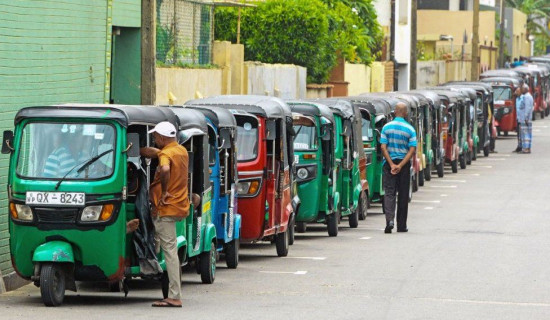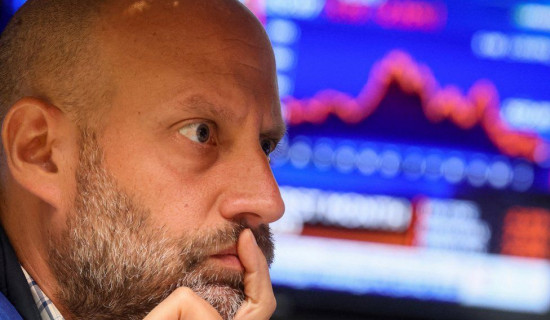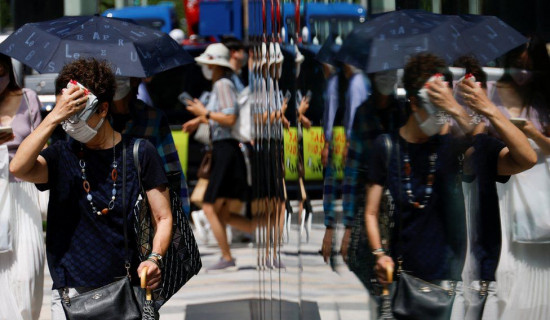- Sunday, 22 February 2026
Arsenal beat Everton as Chelsea win first friendly
Arsenal manager Mikel Arteta said new signing Gabriel Jesus "creates chaos" after Brazil forward scored in a 2-0 friendly win over Everton. The £45m signing continued his impressive pre-season form by firing home from a 33rd-minute corner at the M&T Bank Stadium in Baltimore.
India couple in 'one pizza a month' wedding contract
Wedding agreements between spouses are generally serious business. But the video of one "contract", signed by an Indian couple at their recent wedding, has hit the headlines and gone viral on social media for its unusual content.
National emergency declared after UK's first red extreme heat warning
A national emergency has been declared after a red extreme heat warning was issued for the first time, as temperatures could hit 40C (104F). The Met Office's highest warning covers an area including London, Manchester and York on Monday and Tuesday.
India transgender pilot's long fight to fly
The reason, according to the medical assessment report issued by the Institute of Aerospace Medicine, was that as long as a person took the medicines, they would suffer from gender dysphoria. Gender dysphoria refers to the unease caused by a perceived mismatch between biological sex and gender identity.
Sri Lankan president Rajapaksa flies to Singapore
Sri Lankan President Gotabaya Rajapaksa has left the Maldives on a Saudi Airlines flight bound for Singapore, sources have told the BBC. The president had fled to the Maldives a day earlier amid mass protests over Sri Lanka's economic crisis.
One dead, 84 injured in Sri Lanka protests
One person has died and 84 others were injured after protests rocked the Sri Lankan capital of Colombo on Wednesday, hospital officials have said. The 26-year-old man died from breathing difficulties after police forces lobbied tear gas at protesters.
Fifteen shot dead in South Africa bar
At least 15 people have been shot dead in a bar in the South African township of Soweto, police say. Police said gunmen entered the Orlando East tavern in the early hours of Sunday morning and started firing randomly at a group of young people.
Logging, fishing and hunting 'driving extinction'
One in five people around the world rely on wild animals, plants and fungi for food and livelihoods, according to a landmark assessment. But many wild species are not being harvested sustainably, putting food security at risk, the report found.
US guitarist Carlos Santana collapses on stage
Legendary US guitarist Carlos Santana collapsed on stage during an open-air concert near Detroit, Michigan. Medical personnel treated the 74-year-old in Clarkston on Tuesday, and he was taken to a local hospital's emergency department for observation.
Environmentalists sue KLM for 'greenwashing'
Environmental groups are suing Dutch airline KLM, alleging that adverts promoting the company's sustainability initiative are misleading. The groups say it's the first lawsuit to challenge the so-called airline industry "greenwashing".
Heavy rains bring Indian city to a standstill
It's that time of the year again when heavy rains in the Indian city of Mumbai and nearby areas have disrupted the lives of millions of people in the country's financial capital.
Climate change: 'Sand battery' could solve green energy's big problem
Using low-grade sand, the device is charged up with heat made from cheap electricity from solar or wind.
Sri Lanka warns petrol stocks about to run dry
Sri Lanka's energy minister has issued a stark warning over the country's fuel stocks as it faces its worst economic crisis in more than 70 years. Kanchana Wijesekera said the nation only had enough petrol left for less than a day under regular demand.
US stocks see worst first half drop since 1970
US stocks have seen their worst first half of a year since 1970, as concerns grow over how steps to curb inflation will affect economic growth. In the last six months, the benchmark S&P 500 index fell 20.6%, while other major US indexes also dropped sharply.
Japan swelters in worst heatwave since 1875
Japan is sweltering under the hottest day yet of its worst heatwave for almost 150 years. The blistering heat has drawn official warnings of a looming power shortage and led to calls for people to conserve energy where possible.

















-(1).jpg)